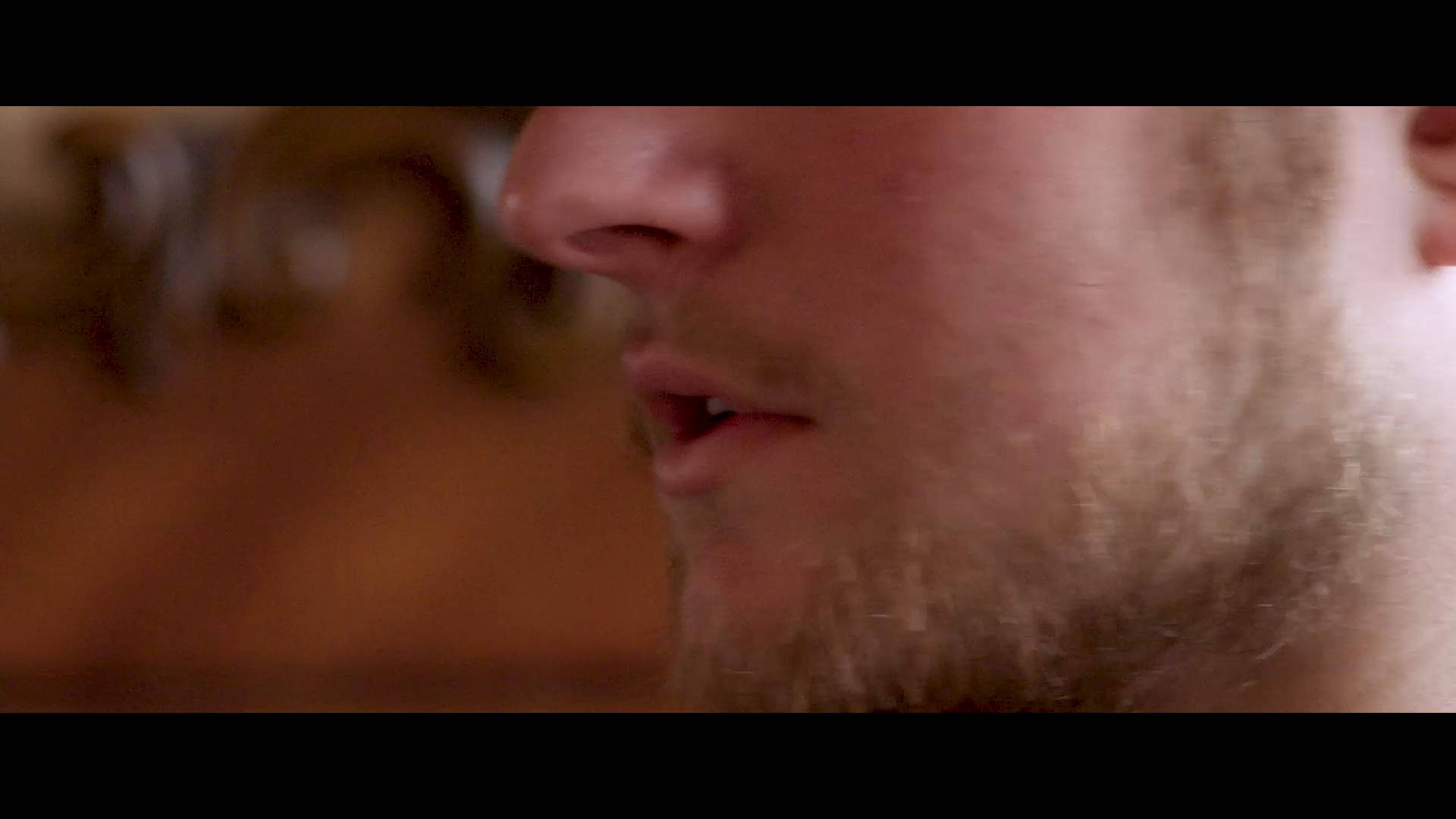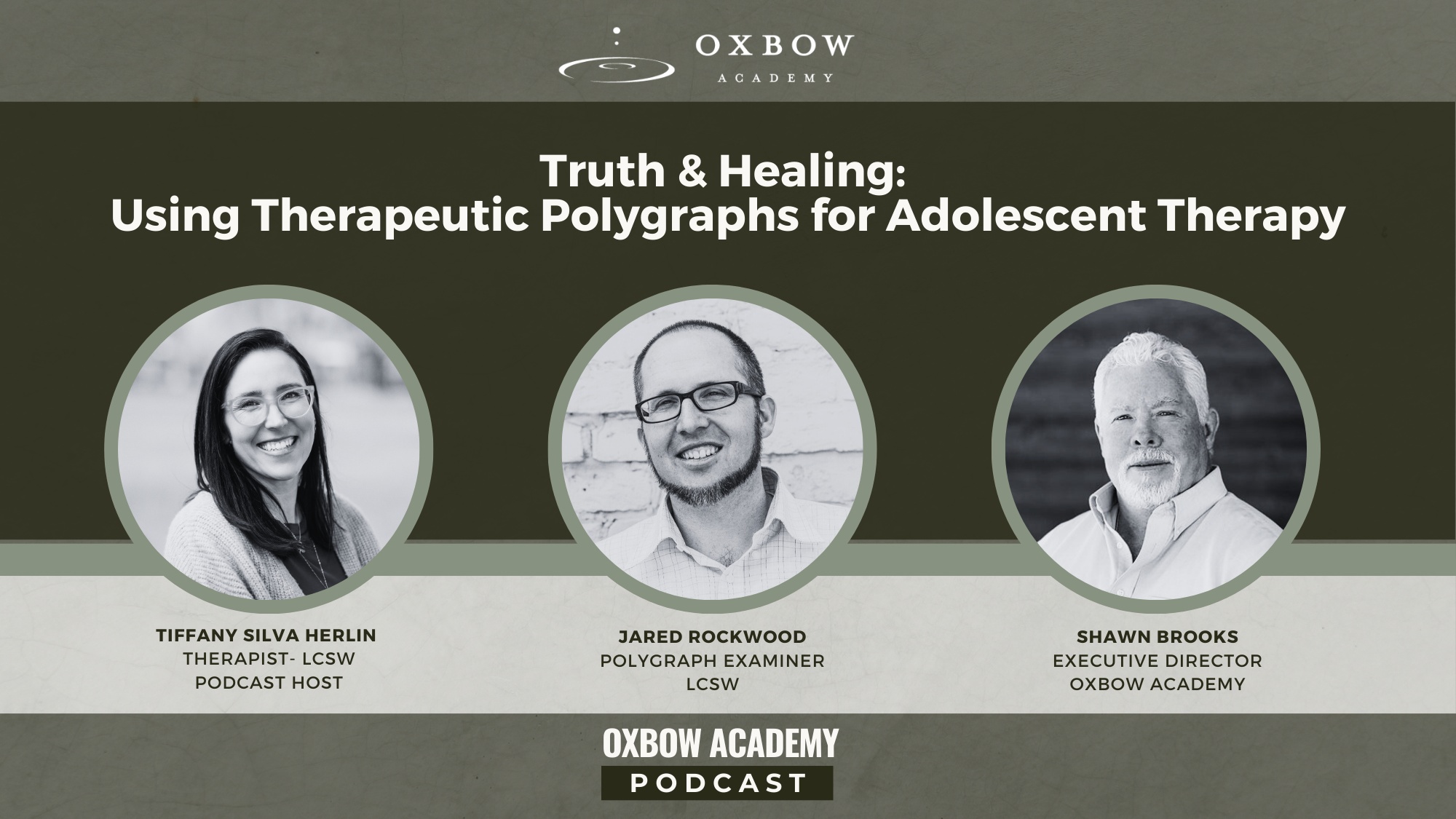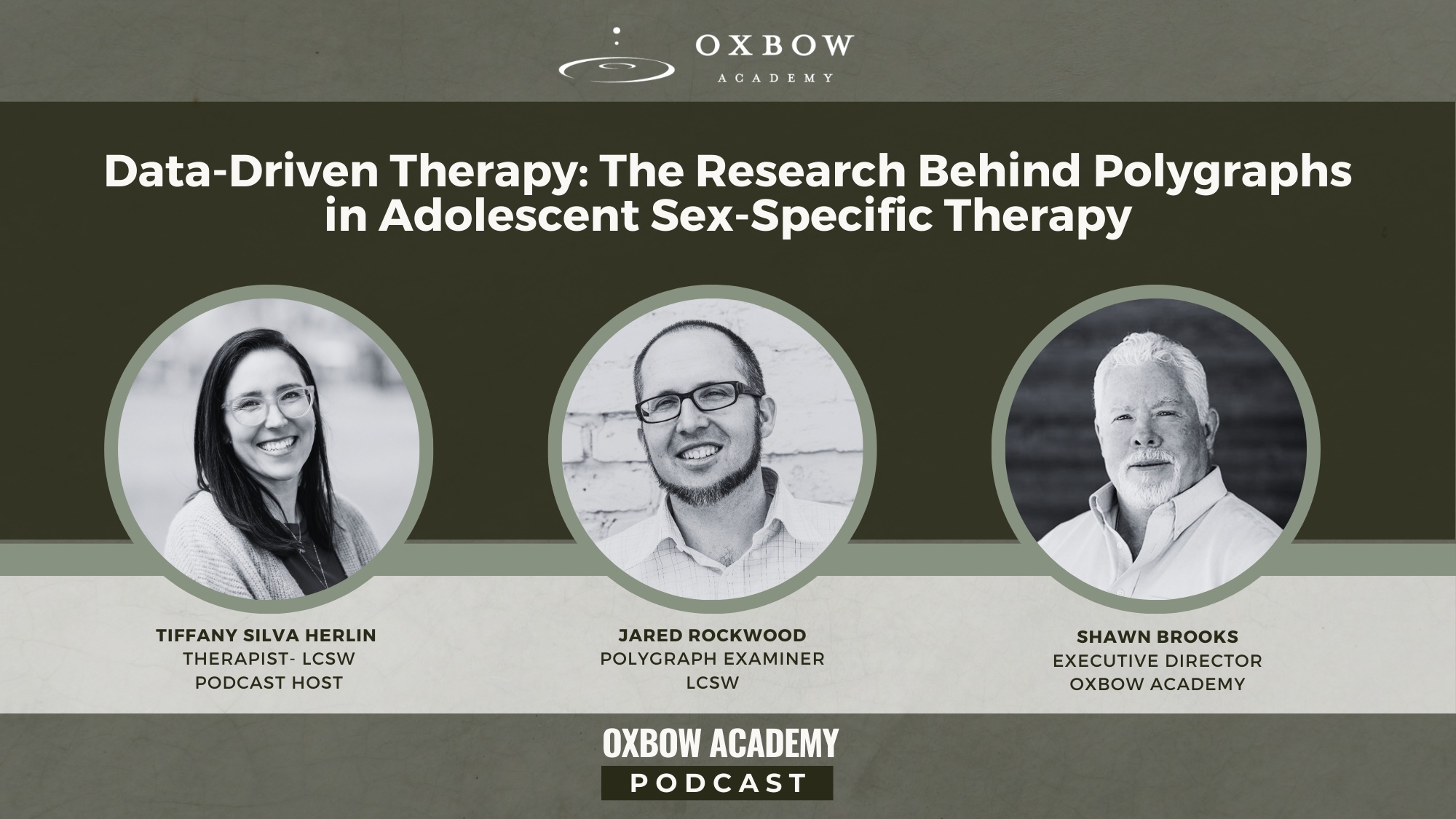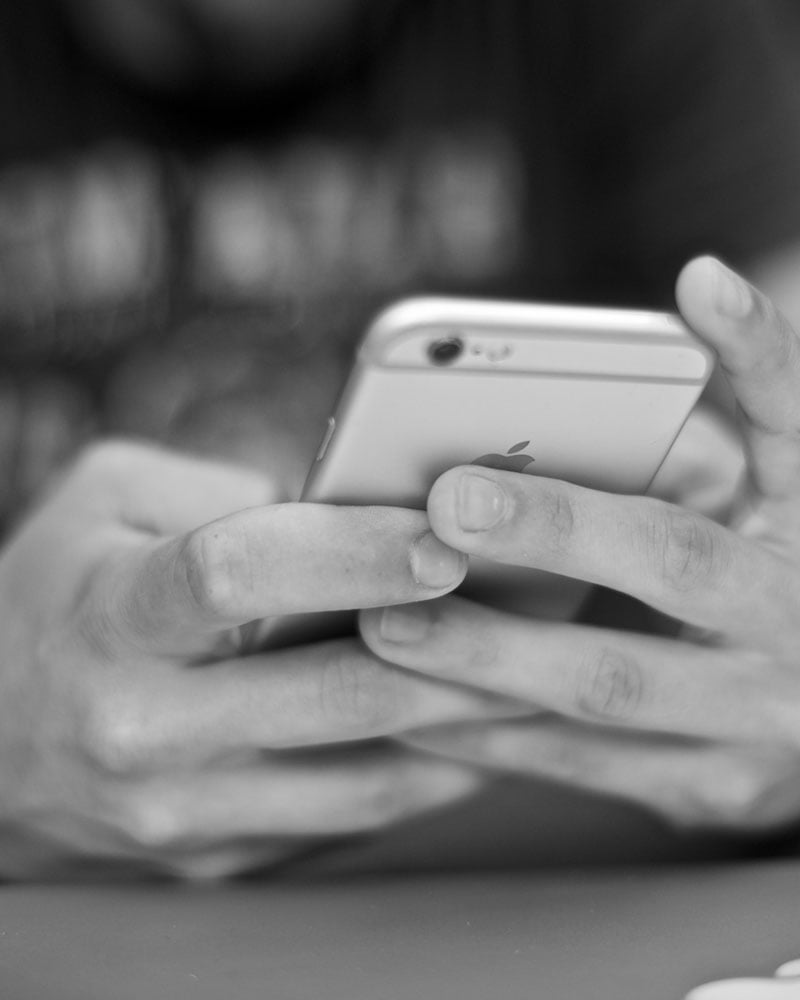
Each student enrolled at Oxbow Academy participates in a comprehensive Sexual Risk Assessment. Upon completion, families receive a complete psychosexual evaluation along with recommendations provided by independent psychologists of their choosing. Integral to this assessment process is the utilization of clinical polygraph testing.
At Oxbow, polygraphs are not used to trap students or prove wrongdoing. They’re used to support honesty, uncover root causes of behaviors, and restore hope for families who feel lost in secrecy and confusion.
When young men come to Oxbow Academy, many of their families have lost confidence in one another. There is no basis for trust.
Unless families have trust, they cannot heal. One of the most valuable aspects of the clinical polygraph examination is that it is a way to begin to rebuild trust.
The use of clinical polygraph testing as part of a treatment program provides families with a level of certainty about the need for treatment that they could not get any other way.
Clinical polygraph gives scientific validity to the need for a sex-specific treatment program. Our internal research shows that students who complete a clinical polygraph move faster in treatment, make more meaningful disclosures, and experience stronger relational repair with their families. When families receive the clinical polygraph results, they have the best possible understanding of the kind of support that their sons need.

In the programs that include a clinical polygraph exam as part of their treatment program, the kids seem to spend a lot less time in therapy than they do with the kids that do not take a clinical polygraph exams.
We're Here To Help. Recovery Is Possible.
Your teen can recover from sexual behavioral problems. Contact one of our trained representatives for a free, private consultation
Media Spotlight: Real Voices on the Polygraph Process
Real Experiences. Real Impact.

Hearing directly from students and therapists brings the polygraph process to life. In this short video, Oxbow alumni and mental health professionals explain how the clinical polygraph:
- Builds trust with therapists and families
- Encourages early, honest disclosure
- Reduces shame and secrecy
- Supports individualized treatment planning
See how the polygraph helps jumpstart the healing process, honestly, safely, and effectively.
Oxbow Academy’s Clinical Polygraph Podcast Episodes
We also invite you to listen to two insightful podcast episodes featuring Oxbow’s Executive Director, Shawn Brooks, and licensed clinical social worker/polygraph examiner Jared Rockwood. Hosted by Tiffany Herlin, LCSW, these conversations explore everything from ethics and accuracy to preparation and real-life impact.
Episode 14: Unmasking the Truth: The Clinical Polygraph and Its Critical Role in Sex-Specific Therapy for Teenage Boys

In this eye-opening episode, Tiffany, Shawn, and Jared break down how clinical polygraphs differ from forensic lie detector tests, how they support teens in disclosing hidden truths, and why this controversial tool is a cornerstone of compassionate, personalized care at Oxbow.
Episode 15: Data-Driven Therapy: The Research Behind Polygraphs in Adolescent Sex Therapy

This episode goes behind the scenes of Oxbow’s data and research on clinical polygraph use. Learn how the team overcame early skepticism to implement polygraphs ethically, and how the results have transformed student outcomes from faster treatment progress to improved academic and behavioral success.
Misconceptions About Polygraph Testing
Most people think of polygraph testing as a lie detector test. They imagine police officers give these tests in dimly lit rooms as part of a criminal investigation.
These images are understandably off-putting. No parent wants their son treated like a sex offender or criminal. But the reality of a clinical polygraph examination could not be further from those unsettling images.
The use of clinical polygraph testing during a treatment program ensures each student receives the best treatment possible. Examinees are treated with compassion and respect throughout the treatment process.
Moreover, clinical polygraph examiners have nothing to do with law enforcement. These third-party clinical polygraph examiners are all clinical professionals who have experience working with youth.

While anxiety is normal before a polygraph, nervousness alone will not cause someone to fail. The polygraph measures physiological responses to deception, not fear. Most students report feeling relieved after completing their test, especially when they are honest.
Modern polygraph techniques are not a matter of lie detection. Instead, the polygraph instrument monitors physiological responses like blood pressure and heart rate. These physiological responses help in the detection of deception.
Careful monitoring examinations are used to prevent a false positive or any other incorrect test results.
The use of the polygraph examination is for treatment, not punishment. Each person who takes part in the examination process is treated as an innocent person.
Neither the polygraph examiners nor the Oxbow Academy treatment professionals ever lose sight of the fact that the examinees are vulnerable, still-developing teen boys.
More accurate information about polygraph testing is available through the American Polygraph Association
The Reality of Clinical Polygraph Examinations
Clinical polygraph procedures encourage truth-telling by design. The type of examination Oxbow Academy uses during the evaluation process is a specific issue examination.
The clinical polygraph examiners provide the examinees with the best support possible to enable the examinees to pass the clinical polygraph test. The purpose of the clinical polygraph test is not the conviction of a sex offender. The purpose of the procedure is to help a vulnerable teenage boy find the best treatment possible. The clinical polygraph also helps to re-establish a relationship with the truth and rebuild trust with his parents.
Before students ever enter the clinical polygraph testing office, they begin to build a relationship with their Oxbow Academy therapist. They are also told they will be taking a clinical polygraph from the beginning. This awareness helps to build trust in the treatment process and makes taking the clinical polygraph a more relaxed situation. For both the student and the therapist, building rapport is essential.

Before any polygraph takes place, students spend six to eight weeks preparing with their therapist. This preparation includes learning what to expect, understanding the purpose, reviewing possible questions, and developing enough trust to be honest.
Therapists ask students difficult questions. Therapists ask students about their past sexual behaviors and fantasies, and their past experience with sexual abuse.
For most students, the disclosure process is similar to the story of Hansel and Gretel. A student will drop one piece of information. The student will see how his therapist and family react. Then the student gradually reveals more information as they feel safe doing so.
Little by little, these disclosures become like a trail of breadcrumbs that leads to the truth.
The disclosure process cannot be rushed. Typically, the process will take at least one or two months.
The information helps to detect high-risk behaviors that suggest students may need specialized, sex-specific inpatient treatment. Therapists use the information they gather to create a sexual history disclosure.
The clinical polygraph examiners receive the sexual history disclosure and other information gathered by the therapists, teachers, and staff members before the clinical polygraph test. The examiners use the information to help draft relevant questions.
Before the test even begins, students take part in a pre-test interview. This interview helps to further refine relevant questions and helps the examiner to create control questions.
The pre-test interview is also used to help build rapport between the examiner and examinee to encourage non-deceptive behavior. Questions are age-appropriate and carefully worded to avoid confusion. Students also review and approve the questions beforehand and have the opportunity to suggest changes.
The questioning technique that examiners use is age-appropriate, respectful, and compassionate.
Everything possible is done to help students pass the clinical polygraph examination. However, sometimes students must take the clinical polygraph test more than once before they pass.
After students pass the clinical polygraph examination, the student, their family, and the treatment team can begin an honest discussion about the future. Their plans will be based on scientific evidence provided by the disclosure test results.
It was a chance for me to become open… to start that foundation of trust again, and break down the walls that were already there.
After Receiving the Clinical Polygraph Test Results
The clinical polygraph examination is one of the most valuable steps in the evaluation process. Third-party psychiatric professionals receive the passed clinical polygraph results, information on how the student has progressed at Oxbow Academy, and a sexual disclosure. Then, these professionals use this information to complete a psychosexual evaluation.
Families receive the full psychosexual evaluation and recommendations from third-party psychologists of their choice. Therefore, families know to the highest degree of certainty if their sons require sex-specific treatment. This information empowers families to find the best treatment program for their son, whether or not that treatment program is Oxbow Academy. In fact, 80% of students pass their polygraph on the first try. Of those who do not, most eventually admit to minimizing or omitting information, and those new disclosures are not punished but welcomed as signs of progress.

Families will have a clear understanding of their son's past sexual behaviors. If information comes to light that is relevant to potential sex offenses, then their son's involvement in a sex-specific treatment program typically helps to the possibility of reoffending and mitigate the outcome of any criminal investigation.
Involvement in an appropriate treatment program, such as Oxbow Academy, is sufficient to prevent some students from becoming a part of the criminal justice system.
Most importantly, not only can families plan the best course of treatment for their sons, but they can also begin to rebuild trust.
It made me realize for the first time that I really did need help and that I did have a problem.
The Importance of the Clinical Polygraph Examination
Due to the high quality of professional treatment available at Oxbow Academy, teen boys come to the Utah-based treatment program from across the United States, and across the world.
From the time young men arrive at Oxbow Academy to the time of their discharge, they are treated with compassion and respect.
The clinical polygraph exam is a valuable step in the Sexual Risk Assessment. It is part of the sexual risk assessment offered at Oxbow Academy. It allows the third-party psychologist to have the most accurate information about your son, and be able to provide a comprehensive evaluation and recommendations for your son.
Without the polygraph, we would be left guessing. With it, we can identify hidden trauma, undisclosed victims, or past abuse, which helps us build a trauma-informed treatment plan that addresses the full story, not just surface behavior.

Without the clinical polygraph, the psychosexual evaluation may not be fully accurate because the psychologist may not have all of the appropriate information to fully evaluate your son.
Once your son successfully passes a clinical polygraph, then they can complete a full psychosexual evaluation. Until the psychosexual evaluation is completed, it is not possible to know what kind of treatment is best for your son.
Moreover, during their time at Oxbow Academy, students learn about consent and healthy sexual behaviors, which is valuable whether they are found to require sex-specific treatment or not. As a parent, once your son passes a clinical polygraph, you can have a better understanding of what is really going on with your son and know that you have taken appropriate preventative measures to help them whether they need sex-specific treatment or not.
It’s often because they do like us that they lie to us, they don’t want to hurt us!
You Have Questions, We Have Answers. Your Call is Confidential.
Oxbow Academy is fully operational during the COVID-19 crisis. Contact us if you need help with treatment for sexual addiction, sexual abuse, pornography abuse and other compulsive behavior issues.
What the Data Tells Us About the Student Experience
At Oxbow Academy, we’ve surveyed hundreds of students to learn how the polygraph process affects them. Their feedback shows that the experience is supportive, healing, and meaningful, even when difficult.
Key findings from our internal research:
- 95% said their therapist helped them feel prepared for the test.
- 89% felt emotionally supported during the process.
- 79% said that knowing they'd take a polygraph made them more honest.
- Over 80% reported feeling more honest overall because of the polygraph.
- 25% said they would not have been honest at all without it.
Even students who were initially resistant often described the polygraph as a turning point in their healing.
Addressing Concerns About Harm or Inaccuracy
We understand that the word “polygraph” can trigger fear, especially for families already in crisis. But when done ethically and compassionately, clinical polygraphs are both safe and accurate.
- Accuracy: Clinical polygraphs used for disclosure or maintenance are about 85% accurate, significantly better than a person’s ability to judge honesty (which averages 54%).
- Nervousness Does Not Indicate Lying: Feeling anxious is normal and does not cause someone to fail.
- Psychological Safety: The polygraph is never used punitively. Students are treated as developing teens, not criminals.
- When It Feels Hard: Some students (about 20%) describe the polygraph as “damaging.” But often, this perception is rooted in anticipatory fear, especially fear of how parents will react, not from the process itself.
- Student Support: The entire experience is structured around safety, empathy, and choice. Students can pause or stop at any time.
The Healing Impact of Honesty
Secrecy fuels shame. Shame, in turn, feeds compulsive, harmful behavior. At Oxbow Academy, the clinical polygraph process is designed to interrupt that cycle compassionately and effectively.
When a student feels safe enough to be honest, everything changes.
Why Honesty Matters
Honest disclosure is more than just a confession; it’s the foundation of meaningful therapy. Many of the boys who come to Oxbow have spent months or years hiding key parts of their story out of fear, confusion, or guilt. The polygraph helps create a moment of courage and clarity where that story can finally come into the light.
Here’s how that honesty supports healing:
- Revealing Root Causes
Many problematic sexual behaviors are rooted in unresolved trauma, early exposure to pornography, past victimization, or distorted beliefs about relationships and identity. The polygraph helps uncover these hidden factors so they can be addressed through trauma-informed therapy. - Improving Treatment Planning
Therapists rely on accurate information to develop personalized, effective treatment strategies. When students disclose the full truth, sometimes for the first time, their treatment plan becomes clearer and more targeted. - Fostering Family Accountability
Families are part of the healing process. When a teen discloses openly, parents can respond with informed support instead of fear or assumptions. This builds a stronger foundation of mutual trust and responsibility at home. - Rebuilding Self-Respect and Confidence
Holding on to secrets creates internal conflict. Letting go of those secrets can feel like lifting a weight. Students often describe the relief and pride they feel after being honest, which contributes to a renewed sense of integrity and self-worth. - Encouraging Emotional and Academic Progress
Once emotional healing begins, academic and social progress often follows. Students who complete a polygraph successfully tend to engage more fully in their education and relationships. They see a future for themselves and start working toward it.
In a setting where safety, preparation, and compassion are prioritized, clinical polygraph testing becomes more than a tool it becomes a turning point.
Many parents find it difficult to tell healthy curiosity about sex from a potentially dangerous situation. There are clinical evaluations that can help make that determination easier. One of these evaluations is the Sexual Addiction Screening Test (SAST).
On the SAST, you will answer a series of simple yes or no questions about their teen. The answers are completely confidential. No information connects you to your assessment. After you complete the SAST, you will be taken to a new page that shows a score representing the level of risk.
After you get your score, you will have the chance to request a call from someone who can help answer your questions. You will only be contacted if you make a request. Whether you request a call or not, your information will remain confidential, and you will be under no obligation.

